
Children’s Services Reform Research
This Children’s Services Reform Research study is a Scotland-based research study which was undertaken by CELCIS, the Centre for Excellence for Children’s Care and Protection.
CELCIS was asked by the Scottish Government in to carry out a research study to improve the understanding of current Children’s Services structures and delivery models in Scotland and how services can best support the needs of children, young people and their families. The research looked at how services are provided and configured in Scotland and drew on a range of international evidence too. The news announcement of this work can be found here.
Taking a wide focus on what is needed to ensure children, young people and families get the support they need when they need it, the research team adopted a broad definition of ‘children’s services’ which includes health, education, and youth justice services provided by the public sector, third sector and private sector partners, and the workforces within these.
While this particular study did not specifically ask for children and young people to come forward to share their views and experiences of the support and services they need, the researchers took very careful account of the views that children and young people had already shared in relevant research and reviews into services for children, including the Independent Care Review. Similarly, the views of parents and carers were taken account of from what has been shared in relevant research and reviews into services for children.
The research started in September 2022 and was completed in December 2023. All the reports of the findings of the research have been published, and have been shared with Scottish Ministers.
Take a look at this video explainer which gives an overview of the purpose, scope and conclusions of the Children’s Services Reform Research study.
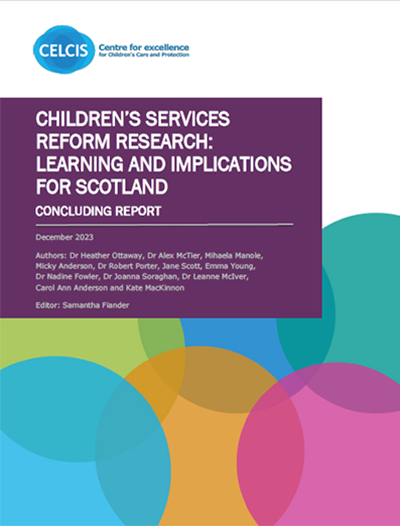
Children's Services Reform Research: Learning and Implications for Scotland
This concluding report brings together key themes and learning from across the study’s findings and determines that there are a range of elements which contribute to creating the optimal conditions for implementing effective, sustainable change to improve support and outcomes for children, young people and families.
This report was published on 13 December 2023
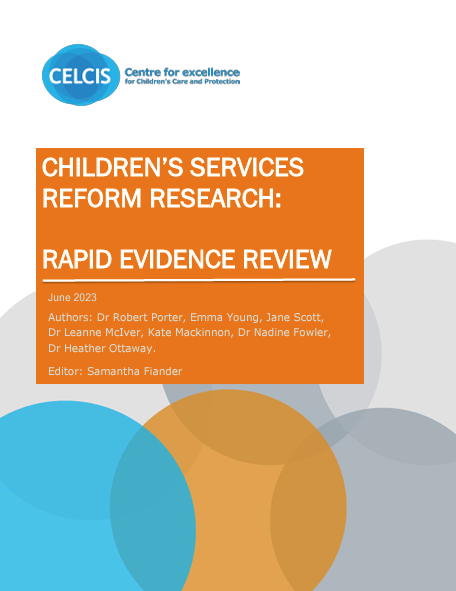
Strand 1: Rapid Evidence Review reviewed existing published national and international research evidence focused on better understanding the evidence associated with different models of integration of children’s services with health and/or adult social care services in high income countries, as defined by the World Bank. The research questions which this review sought to address were:
- What models of integration exist for the delivery of children’s social work services with health and/or adult social care services in high income countries? and
- What is the strength of evidence about their effectiveness in improving services, experiences and outcomes for children, young people and their families?
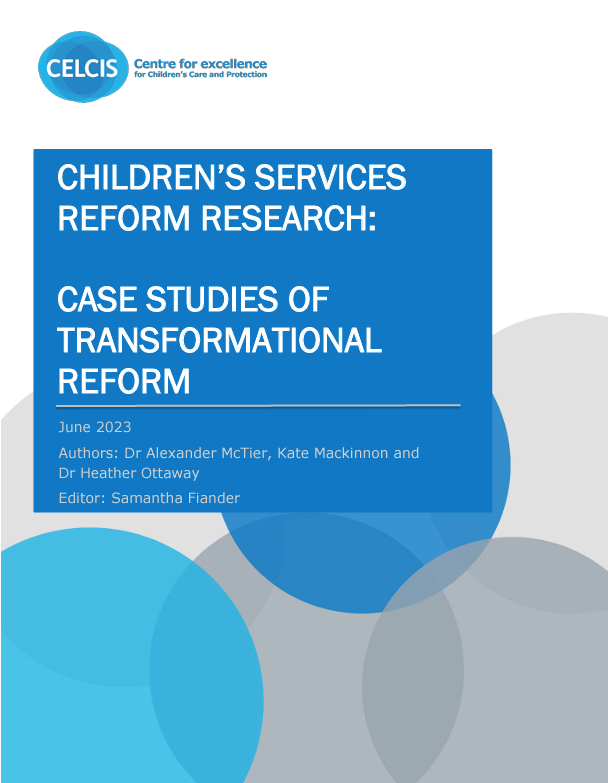
Strand 2: Case studies of transformational reform programmes examined a range of approaches to the delivery of children’s services to better understand the evidence regarding systems-level integration between children’s social work/social care with health services and/or adult social care. The case studies were drawn from a range of contexts, from national to highly decentralised structures and modes of delivery, in five high-income countries: Finland, the Netherlands, New Zealand, Northern Ireland, and the Republic of Ireland. A sixth case study drew on learning from Scotland’s experiences of national service reorganisation through the development of Police Scotland. These country case studies were brought together in one report to consider the key learning and messages for Scotland.
Read the report and summary here
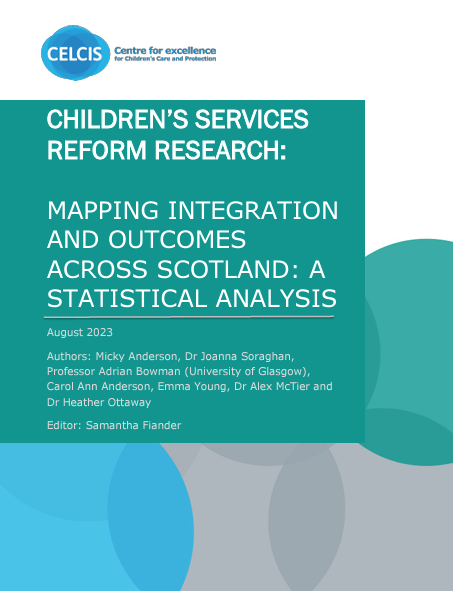
Strand 3: Mapping integration and outcomes in Scotland: A statistical analysis investigated if the most recent major structural reform of health and social care services to take place in Scotland has had an impact on outcomes for children, young people and families. We mapped the range of different approaches to integrated service delivery across Scotland’s 32 local authority areas and investigated, through the statistical modelling of administrative data, any potential effects of structural integration on a range of outcomes over time for children and young people supported by public services. In doing this, we also took into account different factors such as geography, poverty, and the impact of the COVID-19 pandemic, to assess the likelihood that any findings were directly about integration rather than as a result of other factors.
Read the reports and summary here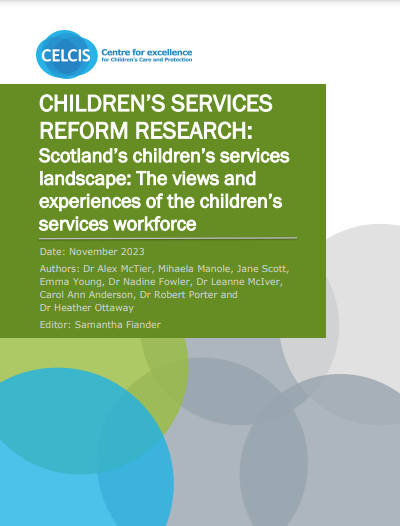
Strand 4: Scotland’s children’s services landscape: The views and experiences of the children’s services workforce explored, through responses to an online survey, interviews and focus groups, the opportunities, challenges, barriers and facilitators that members of the workforce identify as factors which bring about high quality experiences and outcomes for children, young people and families using services; close multi-agency working between practitioners across different services; continuity of support when young people transition to adult services; high quality support for the workforce and transformational change in services. This strand of the research also produced additional insights regarding workforce perceptions of the association between integration and outcomes for children, young people and families and the wellbeing of the workforce.
Read the reports and summary hereFind out about who led the research
The research study was led by CELCIS’s Head of Evidence and Innovation, Dr Heather Ottaway, who oversaw the research team which drew on multi-disciplinary expertise. Having started her career as a children and families social worker in Scotland, Dr Ottaway has led national organisational research in Wales which informed the development of the National Adoption Service, and has a strong research profile nationally and internationally, particularly in the field of family-based care for children.
Dr Robert Porter is led strand 1 of the research: Rapid Evidence Review. He is Research Lead at CELCIS and is an experienced socio-legal academic with degrees in psychology and a PhD in Law. He has led on projects relating to legal representation within Scotland’s Children’s Hearings, and worked on legal empowerment and access to justice internationally.
Dr Alex McTier led strand 2 of the research: Case Studies of Transformational Reform Programmes and co-leading strand 4: Workforce Experiences, with a focus on the workforce surveys. He is an Evidence and Evaluation Specialist with CELCIS. Alex specialises in understanding children’s statistical data in Scotland and is co-chair of the Monitoring and Evaluation Group to support the implementation of Scotland’s National Guidance for Child Protection and he is a member of the National Child Protection Leadership Group’s Data Sub-Group.
Michael Anderson led strand 3 of the research: Mapping Integration and Outcomes Across Scotland: A Statistical Analysis. He is the Data Lead at CELCIS and has worked with the Children Looked After Statistics dataset on a variety of projects in Scotland. He leads on the implementation of the Bright Spots programme within Scotland and sits on the Scottish Government’s Social Work Statistics Group, contributing to development of data collected in relation to children and families in contact with social work.
Mihaela Manole co-led strand 4 of the research: Workforce Experiences, and focused on the workforce survey. She is an Implementation Research Fellow at CELCIS and her expertise focuses on promoting the use of evidence in policy formulation and supporting capacity building in the use of data for improvement. Recent projects include providing data and evidence support for the Addressing Neglect and Enhancing Wellbeing programme which centres on enhancing GIRFEC practice for children and families before their needs escalate to social work involvement; providing data and evidence support at local and national levels for the Scottish Government’s Whole Family Wellbeing Fund programme and analysis of Scotland’s Child Protection Committees’ structure and functions.
Jane Scott co-led strand 4 of the research: Workforce Experiences, and focused on the interviews and focus groups with the children’s services workforce. She is a research fellow at CELCIS and has over 30 years’ experience with practice and research, including working as a Lecturer and Senior Research Fellow at the Universities of Loughborough, Dundee and Stirling. Jane has extensive experience in undertaking literature reviews, focus groups and interviews with a wide range of individuals including children, young people and families who have experience abuse and neglect as well as with frontline staff and strategic managers. The team involved in doing the research included experienced researchers, data analysts and policy experts.
If you have a query for research team concerning the different strands of work, please send an email to celcis.csr-research@strath.ac.uk



